After several years in which the Congregation for the Doctrine of the Faith was conspicuously silent, perhaps kept silent as Pope Francis tried to decrease its importance among the curial dicasteries, a new leadership brings new sounds. Or old sounds repeated, perhaps.
 Archbishop Luis Ladaria Ferrer, soon to be a cardinal, took over the reins at the CDF after Cardinal Gerhard Müller was let go about a year ago. And since then, the Congregation published two major texts: Placuit Deo on Christian salvation, in February, and Oeconomicae et pecuniariae quaestiones on ethics in economy (published jointly with the Dicastery for Integral Human Development), in May. In comparison, that is the same number of documents released during the entire period that Cardinal Müller headed the CDF, from 2012 to 2017.
Archbishop Luis Ladaria Ferrer, soon to be a cardinal, took over the reins at the CDF after Cardinal Gerhard Müller was let go about a year ago. And since then, the Congregation published two major texts: Placuit Deo on Christian salvation, in February, and Oeconomicae et pecuniariae quaestiones on ethics in economy (published jointly with the Dicastery for Integral Human Development), in May. In comparison, that is the same number of documents released during the entire period that Cardinal Müller headed the CDF, from 2012 to 2017.
And this week, another document was released, not by the CDF itself, but by its prefect, who, it may be safely assumed, is given much more freedom to function as Pope Francis’ personal choice to head the CDF. But that does not mean that something entirely new now comes from the offices of the Congregation. Archbishop Ladaria’s recent article focusses on an issue that has been debated for decades and it is firmly rooted in the teaching of Pope St. John Paul II.
On the issue of the ordination of women to the priesthood, Archbishop Ladaria once more confirms that that is not something the Catholic Church has the authority for. He writes the article in response to “voices heard in several countries which call into doubt” this doctrine, which was so clearly declared by Pope St. John Paul II, and confirmed by his successors. The archbishop stresses that what John Paul II stated in the 1994 Apostolic Letter Ordinatio sacerdotalis was definitive then, and remains so now.
Below I present my translation of the article, based on the German text found here.
“Remain in me, as I remain in you. Just as a branch cannot bear fruit on its own unless it remains on the vine, so neither can you unless you remain in me” (John 15:4). Only because of her roots in Jesus Christ, her founder, can the Church give life and salvation to the entire world. These roots are in the first place to be found in the sacraments, at the heart of which is the Eucharist. Established by Christ, the sacraments are the pillars of the Church, who is continuously built up by them as His body and His bride. The sacrament of ordination is deeply connected to the Eucharist, through which Christ makes Himself present as the source of her life and action. Priests are “conformed to Christ”, so that “they can act in the person of Christ the Head” (Presbyterorum ordinis, n. 2).
Christ wanted to confer this sacrament upon the twelve Apostles, who were all men, and they have, in time, conferred it upon other men. The Church knew herself to be bound to this decision of the Lord, which excludes validly conferring the ministerial priesthood to women. In the Apostolic Letter Ordinatio sacerdotalis, of 22 May 1994, John Paul II taught: “Wherefore, in order that all doubt may be removed regarding a matter of great importance, a matter which pertains to the Church’s divine constitution itself, in virtue of my ministry of confirming the brethren (cf. Lk 22:32) I declare that the Church has no authority whatsoever to confer priestly ordination on women and that this judgment is to be definitively held by all the Church’s faithful”(n. 4). The Congregation for the Doctrine of the Faith confirmed, in response to a question regarding the teaching of Ordinatio sacerdotalis, that this concerns a truth which belongs to deposit of faith (depositum fidei) of the Church.
In this light it is a great concern to me that there are voices heard in several countries which call into doubt the definitive character of the aforementioned teaching. In order to prove that this teaching is not definitive, the argument goes that is has not been defined ex cathedra and can thus be changed by a future pope or council. Spreading such doubts causes much confusion among the faithful, and not only with regard to the sacrament of Holy Orders, which belongs to he divine constitution of the Church, but also with regard to the ordinary Magisterium, which can infallibly pronounce Catholic doctrine.
On the first point: as for the ministerial priesthood, the Church knows that the impossibility of the ordination of women is part of the “substance” of the sacrament (cf. DH 1728). The Church lacks the authority to change this substance, as she is being built up as Church through the sacraments as established by Christ. This is not a matter of discipline, but a doctrine, as it concerns the structure of the sacraments, the first places of encounter with Christ and the transmission of faith. This is then not some obstacle which blocks the Church from fulfilling her mission in the world more effectively. When the Church can’t intervene in this question, the basis of it lies in the fact that the original love of God intervenes in it. He himself acts in the ordination of priests, so that, always and in every situation of its history, Jesus Christ is visible and active in the Church, “as the principal source of grace” (Pope Francis, Evangelii gaudium, n. 104).
In the awareness that she cannot change this tradition out of obedience to the Lord, the Church therefore tries to deepen its meaning. For the will of Jesus Christ, the Logos, is not without meaning. The priest acts in the person of Christ, the bridegroom of the Christ, and his being male is an indispensable aspect of this sacramental representation (cf. Congregation for the Doctrine of the Faith, Inter insigniores, n. 5). To be sure, the diversity of tasks between men and women does not entail subordination, but a mutual enrichment. It must be remembered that the perfect image of the Church is Mary, the mother of the Lord, to whom was not given the apostolic ministry. This makes evident that the original language of masculinity and femininity, which the Creator has inscribed in the human body, is included in the work of our salvation. Precisely this fidelity to Christ’s plan with the ministerial priesthood allows the continuous deepening and promotion of the role of women in the Church, because “Woman is not independent of man or man of woman in the Lord” (1 Cor, 11:11). This may also shine a light on our culture, which struggles to understand the meaning and beauty of the difference between man and woman, which also affects their complementary missions in society.
On the second point: the doubts raised about the definitive character of Ordinatio sacerdotalis also have a major effect on how the magisterium of the Church is to be understood. It is important to emphasise that infallibility not only refers to solemn declarations from a council or to papal definitions made ex cathedra, but also to the ordinary and general magisterium of the bishops spread throughout the world, when they declare, in unity with each other and with the pope, Catholic doctrine as ultimately binding. John Paul II based himself on this infallibility in Ordinatio sacerdotalis. He also did not declare a new dogma, but confirmed, to remove any doubts, with the authority given to him as succesor of Peter in a formal declaration, what the ordinary and general magisterium had presented as belonging to the deposit of faith throughout all of history. This very kind of statement corresponds with a style of ecclesial communion in which the pope does not wish to act alone, but as a witness in listening to an uninterrupted and living tradition. Furthermore, no one will deny that the magisterium can infallibly express truths that are necessarily connected to what was formerly revealed as good. For only in this way can it fulfill its task to keep the faith holy and interpret it faithfully.
Further proof of John Paul II’s efforts in considering this question is the prior consultation with the heads of those bishops’ conferences who most had to deal with the problem. All, without exception, declared with full confidence that the Church, out of obedience to the Lord, did not have the authority to allow women to receive the sacrament of ordination.
Pope Benedict XVI also confirmed this doctrine. In the Chrism Mass on 5 April 2012 he recalled how John Paul II had declared “irrevocably” that the Church “has received no authority from the Lord” regarding the ordination of women. With an eye on those who do not accept this teaching, Benedict XVI wonders, “But is disobedience really a way […]? Do we sense here anything of that configuration to Christ which is the precondition for all true renewal, or do we merely sense a desperate push to do something to change the Church in accordance with one’s own preferences and ideas?”
Pope Francis has likewise taken position on this question. In his Apostolic Letter Evangelii gaudium he underlines: “The reservation of the priesthood to males, as a sign of Christ the Spouse who gives himself in the Eucharist, is not a question open to discussion.” He also urges us not to interpret this doctrine as an expression of power, but as a service, so that the equal dignity of man and woman in one body of Christ may be better understood (n. 104). In the press conference during the return flight from the apostolic journey to Sweden on 1 November 2016 Pope Francis emphasised: “As for the ordination of women in the Catholic Church, the last clear word was given by Saint John Paul II, and this holds.”
The Church in our time is called to response to many challenges of our culture. It is essential that she remains in Christ, like the branches on the vine. The Master therefore invites us to keep His word in us: “If you keep my commandments, you will remain in my love” (John 15:10). Only being faithful to His words, which do not fade, guarantees our rootedness in Christ and in is love. Only the accepting of His wise plans, which take shape in His sacraments, strengthens the Church at her roots, so that she can bear fruit for eternal life.
Luis F. Ladaria, SJ, Prefect of the Congregation for the Doctrine of the Faith”
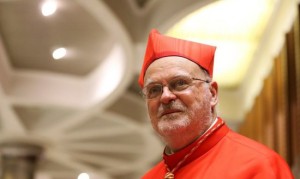 “It surprises me that the topic hasn’t been discussed that much. In Sweden, we have many mixed marriages. But most Catholics aren’t married to practicing Protestants. It is not an issue for us. Of course there are evangelical Christians who would like to receive Communion, but most are non-religious.
“It surprises me that the topic hasn’t been discussed that much. In Sweden, we have many mixed marriages. But most Catholics aren’t married to practicing Protestants. It is not an issue for us. Of course there are evangelical Christians who would like to receive Communion, but most are non-religious.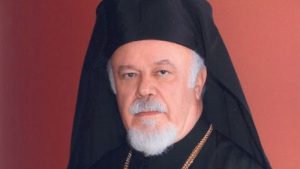 Greek-Orthodox Metropolitan Augoustinos, who hosted Cardinal Woelki in Bonn for the annual plenary meeting of the Greek-Orthodox Church in Germany, expressed himself in similar words after indicating that his church is also following the debate closely. He referred to the Orthodox principle of Oikonomia, which indicates that a regulation can be ignored or a rule broken when it serves the salvation of the person involved. But he then quoted Ecumenical Patriarch Bartholomew I, saying: “As soon as one defines the conditions under which Oikonomia can be applied, Oikonomia itself becomes a rule or regulation.”
Greek-Orthodox Metropolitan Augoustinos, who hosted Cardinal Woelki in Bonn for the annual plenary meeting of the Greek-Orthodox Church in Germany, expressed himself in similar words after indicating that his church is also following the debate closely. He referred to the Orthodox principle of Oikonomia, which indicates that a regulation can be ignored or a rule broken when it serves the salvation of the person involved. But he then quoted Ecumenical Patriarch Bartholomew I, saying: “As soon as one defines the conditions under which Oikonomia can be applied, Oikonomia itself becomes a rule or regulation.”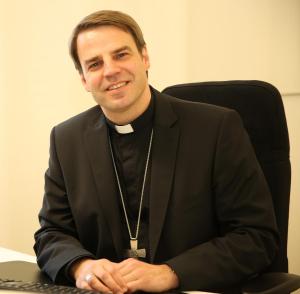 “It is right that we do not turn anyone away from the Communion bench. At that moment no judgement can be made about the discernment of conscience of the individual receiving. I can’t ‘expose’ anyone then. But when we take our understanding of the Eucharist seriously, there can be no superficial practice of giving Communion to just anyone. Therefore, as the priest giving Communion, I am obliged to offer people, at a suitable occasion, personal and spiritual guidance – and explain our understanding of the Eucharist more deeply. And yes, the praxis of individual pastoral care can indeed lead to singular and temporary situations. But in my opinion an official regulation of such exceptions can make it even more likely for such exceptions to become the rule. The current debate already shows that. It is basically less about the “serious spiritual need of individuals,” and more about the interdenominational marriages in general.”
“It is right that we do not turn anyone away from the Communion bench. At that moment no judgement can be made about the discernment of conscience of the individual receiving. I can’t ‘expose’ anyone then. But when we take our understanding of the Eucharist seriously, there can be no superficial practice of giving Communion to just anyone. Therefore, as the priest giving Communion, I am obliged to offer people, at a suitable occasion, personal and spiritual guidance – and explain our understanding of the Eucharist more deeply. And yes, the praxis of individual pastoral care can indeed lead to singular and temporary situations. But in my opinion an official regulation of such exceptions can make it even more likely for such exceptions to become the rule. The current debate already shows that. It is basically less about the “serious spiritual need of individuals,” and more about the interdenominational marriages in general.” Words from Pope Francis, in
Words from Pope Francis, in  This quote is especially interesting as
This quote is especially interesting as 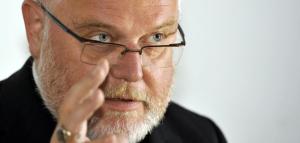 Cardinal Reinhard Marx, president of the German Bishops’ Conference and one of the supporters of the pastoral outreach,
Cardinal Reinhard Marx, president of the German Bishops’ Conference and one of the supporters of the pastoral outreach, 
 Archbishop Luis Ladaria Ferrer, soon to be a cardinal, took over the reins at the CDF after Cardinal Gerhard Müller was let go about a year ago. And since then, the Congregation published two major texts: Placuit Deo on Christian salvation, in February, and Oeconomicae et pecuniariae quaestiones on ethics in economy (published jointly with the Dicastery for Integral Human Development), in May. In comparison, that is the same number of documents released during the entire period that Cardinal Müller headed the CDF, from 2012 to 2017.
Archbishop Luis Ladaria Ferrer, soon to be a cardinal, took over the reins at the CDF after Cardinal Gerhard Müller was let go about a year ago. And since then, the Congregation published two major texts: Placuit Deo on Christian salvation, in February, and Oeconomicae et pecuniariae quaestiones on ethics in economy (published jointly with the Dicastery for Integral Human Development), in May. In comparison, that is the same number of documents released during the entire period that Cardinal Müller headed the CDF, from 2012 to 2017. Bishop Jan Hendriks, auxiliary bishop of Haarlem-Amsterdam, studies the matter in
Bishop Jan Hendriks, auxiliary bishop of Haarlem-Amsterdam, studies the matter in 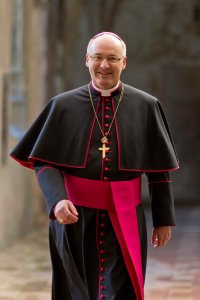
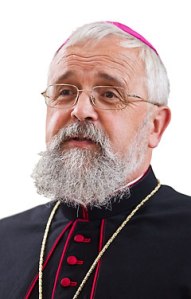 Opposing the actions of the seven bishops is Bishop Gerhard Feige, bishop of Magdeburg and president of the ecumenism commission of the German Bishops’ Conference. In a contribution to Der Zeit last Thursday, Msgr. Feige stated that not taking the chance to help people deepen the joy of the faith and their participation in the Eucharist, as well as promoting ecumenical encounters and strengthening the marriage bond would be “macabre and shameful”. Contrary to other bishops, Msgr. Feige insists that the pastoral outreach exists within modern theological and legal possibilities, referring to the canon law paragraphs which allow local bishops to decide under which circumstances non-Catholic can receive Communion. These circumstances, however, are emergency situations in which the danger of death and the unavailability of ministers of a person’s own denomination play key roles.
Opposing the actions of the seven bishops is Bishop Gerhard Feige, bishop of Magdeburg and president of the ecumenism commission of the German Bishops’ Conference. In a contribution to Der Zeit last Thursday, Msgr. Feige stated that not taking the chance to help people deepen the joy of the faith and their participation in the Eucharist, as well as promoting ecumenical encounters and strengthening the marriage bond would be “macabre and shameful”. Contrary to other bishops, Msgr. Feige insists that the pastoral outreach exists within modern theological and legal possibilities, referring to the canon law paragraphs which allow local bishops to decide under which circumstances non-Catholic can receive Communion. These circumstances, however, are emergency situations in which the danger of death and the unavailability of ministers of a person’s own denomination play key roles.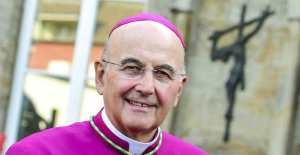 Münster’s Bishop Felix Genn is hopeful of finding a consensus. While the way in which the seven bishops expressed their difficulties with the conference’s vote did not make him happy, he understands their questions of conscience. In an interview for WDR radio Bishop Genn expressed his happiness about the way in which the standing council of the bishops’ conference discussed the issue last week. And although he would have preferred that the seven bishops had first informed the others about their letter before sending it, Bishop Genn’s attitude is perhaps the most consensus-minded in the delegation, which may be a reason for his inclusion. The bishop, for his part, simply thought of his mother’s motto when hearing about being included in the delegation: “One has never got enough work to do.”
Münster’s Bishop Felix Genn is hopeful of finding a consensus. While the way in which the seven bishops expressed their difficulties with the conference’s vote did not make him happy, he understands their questions of conscience. In an interview for WDR radio Bishop Genn expressed his happiness about the way in which the standing council of the bishops’ conference discussed the issue last week. And although he would have preferred that the seven bishops had first informed the others about their letter before sending it, Bishop Genn’s attitude is perhaps the most consensus-minded in the delegation, which may be a reason for his inclusion. The bishop, for his part, simply thought of his mother’s motto when hearing about being included in the delegation: “One has never got enough work to do.”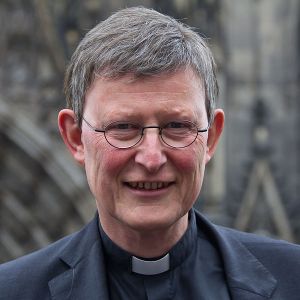 While the letter by Cardinal Woelki, Archbishop Schick and Bishops Zdarsa, Hanke, Ipolt, Voderholzer and Oster received much attention in the media, the signatories themselves treated it as a normal matter of correspondence. Cardinal Woelki, who was visiting Ukraine when the news broke, expressed his surprise at the hype and the talk about dissent. Presenting the questions about intercommunion to Rome was not so much a matter of going against his fellow bishops, but rather came from the importance of the matter: “With several bishops, we were convinced that it would be good to universally coordinate the solution that we have discussed and established here, with an eye on the unity of the Church and the common ground with the other particular churches.” Cardinal Woelki is not so much opposed to the proposals from the conference, to allow non-Catholic spouses of Catholics to receive Communion with their partner on a case-by-case basis, but does not think it is a decision that should be made by the German bishops alone.
While the letter by Cardinal Woelki, Archbishop Schick and Bishops Zdarsa, Hanke, Ipolt, Voderholzer and Oster received much attention in the media, the signatories themselves treated it as a normal matter of correspondence. Cardinal Woelki, who was visiting Ukraine when the news broke, expressed his surprise at the hype and the talk about dissent. Presenting the questions about intercommunion to Rome was not so much a matter of going against his fellow bishops, but rather came from the importance of the matter: “With several bishops, we were convinced that it would be good to universally coordinate the solution that we have discussed and established here, with an eye on the unity of the Church and the common ground with the other particular churches.” Cardinal Woelki is not so much opposed to the proposals from the conference, to allow non-Catholic spouses of Catholics to receive Communion with their partner on a case-by-case basis, but does not think it is a decision that should be made by the German bishops alone.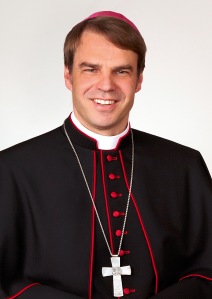 The most extensive explanation for signing the letter comes from Bishop Stefan Oster of Passau. In an article published in the diocesan magazine and
The most extensive explanation for signing the letter comes from Bishop Stefan Oster of Passau. In an article published in the diocesan magazine and 
 The German bishops have been rather popular targets in more conservative Catholic media for their supposed liberal policies and decisions, and sometimes rightly so. In their spring meeting in Ingolstadt, which concluded yesterday, they made another such decision. One that will undoubtedly will be heavily criticised and presented in terms of heresy (looking at you, Gloria TV). However, in this case, the criticism is generally unwarranted.
The German bishops have been rather popular targets in more conservative Catholic media for their supposed liberal policies and decisions, and sometimes rightly so. In their spring meeting in Ingolstadt, which concluded yesterday, they made another such decision. One that will undoubtedly will be heavily criticised and presented in terms of heresy (looking at you, Gloria TV). However, in this case, the criticism is generally unwarranted. Cardinal Marx stated that the bishops have no desire to change dogmatics. The pastoral guide they are proposing will be based on canon 844 §4 in the Code of Canon Law, and it will help a pastor decide if an exception to the rule is possible. Canon 844 §4 discusses the conditions under which a non-Catholic can receive Communion. If there is a danger of death or some other grave necessity (according to the judgement of the local bishop or the bishops’ conference), and if the person involve has no recourse to a minister of their own community, a priest can licitly administer Communion to him or her. The person receiving must also seek the sacrament of their own volition and must manifest the Catholic belief in the sacrament and be otherwise able to receive (just like all Catholics). The bishops claim that there can be such a strong desire in mixed marriages to receive Communion together that not responding to this can endanger the marriage and faith of the spouses. This, they claim, can be the “grave necessity” the Code of Canon Law refers to.
Cardinal Marx stated that the bishops have no desire to change dogmatics. The pastoral guide they are proposing will be based on canon 844 §4 in the Code of Canon Law, and it will help a pastor decide if an exception to the rule is possible. Canon 844 §4 discusses the conditions under which a non-Catholic can receive Communion. If there is a danger of death or some other grave necessity (according to the judgement of the local bishop or the bishops’ conference), and if the person involve has no recourse to a minister of their own community, a priest can licitly administer Communion to him or her. The person receiving must also seek the sacrament of their own volition and must manifest the Catholic belief in the sacrament and be otherwise able to receive (just like all Catholics). The bishops claim that there can be such a strong desire in mixed marriages to receive Communion together that not responding to this can endanger the marriage and faith of the spouses. This, they claim, can be the “grave necessity” the Code of Canon Law refers to.
 “Today is the start of Advent, the period of preparation before Christmas. We celebrate that the Lord has come, but also that He is the one who is coming. We speak of a double, or even triple, coming. This thought is dear to me and nourishes my faith life.
“Today is the start of Advent, the period of preparation before Christmas. We celebrate that the Lord has come, but also that He is the one who is coming. We speak of a double, or even triple, coming. This thought is dear to me and nourishes my faith life.